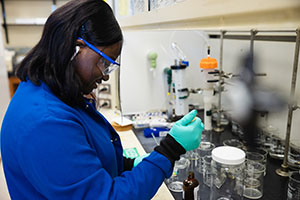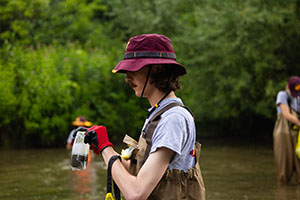Biochemistry: Your gateway to an amazing career
If you’ve always been fascinated by what makes life tick, from the molecules creating energy in your cells to the chemistry of curing diseases, a biochemistry major might just be your career launchpad. But what can you do with a biochemistry degree? What kind of jobs are there for biochemists and what future lies ahead if you pursue this path?
From protecting the environment to participating in groundbreaking discoveries, discover what biochemistry looks like at Central Michigan University.
What is biochemistry and why does it matter?
Biochemistry isn’t just about memorizing molecules. It’s the study of how chemical processes drive the biological systems that keep humans, animals and plants alive. It’s at the heart of scientific breakthroughs—from creating life-saving medications to finding sustainable solutions to feed a growing population.
Exciting career paths for biochemistry graduates
1. Research and development in healthcare
 Want to create life-saving medicines or vaccines? A career in biomedical research offers you the chance to work on the frontlines of scientific discovery. Biochemists in this field often collaborate with pharmaceutical companies or medical research organizations. They design and test solutions for global health challenges such as cancer, autoimmune diseases and infectious outbreaks.
Want to create life-saving medicines or vaccines? A career in biomedical research offers you the chance to work on the frontlines of scientific discovery. Biochemists in this field often collaborate with pharmaceutical companies or medical research organizations. They design and test solutions for global health challenges such as cancer, autoimmune diseases and infectious outbreaks.
Opportunities to consider:
- Developing new drugs and therapies.
- Genetic engineering and CRISPR technology.
- Stem cell and regenerative medicine research.
Why it’s rewarding: Your work has the potential to improve and save millions of lives worldwide.
2. Food and agriculture innovation
Interested in tackling challenges such as global food insecurity or climate change? Biochemistry has a powerful role to play here. By applying molecular science to agriculture, you can improve crop yields, develop eco-friendly pest control methods or create healthier, sustainable food options.
Opportunities to consider:
- Designing genetically modified crops to withstand climate extremes.
- Studying the biochemistry of food preservation and fortification.
- Developing plant-based or lab-grown meat alternatives.
Why it’s exciting: You’ll make an impact on sustainability and the future of food.
3. Forensic science and criminal investigation
Intrigued by the fusion of science and mystery-solving? Forensic science allows you to analyze biological evidence for criminal investigations. Your knowledge of biochemistry can be critical for solving cases and delivering justice.
Opportunities to consider:
- DNA analysis and fingerprinting.
- Toxicology tests for substances in crime scenes.
- Biochemical methods for crime reconstruction.
Why it’s engaging: Your work combines science and justice, solving puzzles no one else can.
4. Environmental biochemistry
 Want to protect the planet? Biochemists are at the forefront of understanding how pollutants affect ecosystems. Imagine working to restore clean water systems, reduce carbon emissions, create plastic alternatives or monitor toxic chemicals in wildlife.
Want to protect the planet? Biochemists are at the forefront of understanding how pollutants affect ecosystems. Imagine working to restore clean water systems, reduce carbon emissions, create plastic alternatives or monitor toxic chemicals in wildlife.
Opportunities to consider:
- Environmental toxicology.
- Renewable biofuels and green energy research.
- Biological solutions to clean up pollution and oil spills.
Why it’s impactful: Your work helps preserve the Earth for future generations.
5. Biotechnology and genetic engineering
See yourself at the cutting edge of science? Biotechnology offers endless possibilities for innovation. Biochemists in this field are constantly pushing the boundaries of what’s possible.
Opportunities to consider:
- Synthetic biology to create new biological systems.
- Biomanufacturing for sustainable industrial materials.
- Engineering microbes for industrial, medical or agricultural use.
Why it’s groundbreaking: This is a field overflowing with discovery and innovation, perfect for creative problem-solvers!
6. Science communication and education
Love explaining complex topics in engaging ways? Science communicators and educators use their biochemistry knowledge to inform and inspire others. Whether you’re teaching in the classroom, writing for a science blog or presenting on documentaries, your ability to distill complex molecular concepts could ignite curiosity in countless individuals.
Opportunities to consider:
- Teaching biochemistry at schools or universities.
- Writing for scientific organizations or media platforms.
- Hosting science workshops or public outreach programs.
Why it’s inspiring: You’ll play a key role in shaping the next generation of scientists or empowering the public with knowledge.
7. Entrepreneurship in biotech
Have a flair for business and innovation? If so, consider using your biochemistry expertise to launch a startup. Many biochemists turn their discoveries into thriving businesses focused on healthcare, sustainability or tech solutions.
Opportunities to consider:
- Starting a biotech company developing innovative healthcare solutions.
- Creating technological tools that empower science professionals.
- Building a consultancy addressing industry-specific biochemical challenges.
Why it’s empowering: You’ll be leading your own success, turning scientific ideas into real-world impact.
8. Government and policy advisory
Passionate about shaping the future of science and its societal applications? By serving as a science advisor or policy maker, you can contribute your biochemistry expertise to influence health, environmental and research policies.
Opportunities to consider:
- Health policy design and regulation.
- Environmental protection and sustainability strategies.
- Grant allocation and funding for scientific research.
Why it’s meaningful: You’ll help bridge the gap between science and society, ensuring that policies align with scientific advancements and ethical considerations.
Why biochemistry makes you in-demand
Your degree equips you with an extensive range of transferable skills that many industries value, including:
- Advanced problem solving and analytical thinking.
- Research design and data interpretation.
- Technical proficiency in cutting-edge laboratory methods.
- An ability to present complex ideas clearly and concisely.
These skills open doors far beyond traditional roles in biology or chemistry, including roles in finance, consulting or even technology development.
Begin your future in biochemistry today
 What path excites you the most? If you’re ready to start exploring these opportunities or want guidance on where to begin, take the first step today. The future is waiting for bold thinkers like you to make their mark.
What path excites you the most? If you’re ready to start exploring these opportunities or want guidance on where to begin, take the first step today. The future is waiting for bold thinkers like you to make their mark.
At Central Michigan University, one of the newer additions to our campus is our Biosciences Building. Students have access to active learning classrooms, six teaching laboratories, an isotope lab, a vivarium for aquatic life, a herbarium and an Imaging Center for Scanning and Transmission electron microscopes.
Biochemistry major requirements
- 23 credit hours of chemistry.
- 8 credit hours of biochemistry.
- 6 credit hours of research, including your undergraduate capstone research project.
- 7 to 8 credit hours of mathematics.
- 10 credit hours of physics.
- 15 credit hours of specialty biology courses.
Our bulletin has a complete list of courses.
Our chemistry program and biochemistry program are approved by the American Chemical Society and accredited by the American Society for Biochemistry and Molecular Biology.